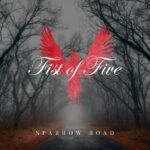For independent bands and musicians, the love for your music is only one piece of the puzzle. You also need to make sure you’re creating and nurturing multiple income streams. In an era where traditional music industry structures have evolved, indie bands are discovering more and more ways to make themselves financially stable.
In this blog post, we explore various income streams for indie bands. From traditional revenue sources like live performances and music sales to emerging opportunities in the digital realm, we’ll lay out the diverse avenues through which independent musicians can generate income and build a sustainable career.
1. Selling Music, Merch, and Tickets
Sell Physical Copies
Despite what you may believe, people are still buying physical music. Although streaming is the overall favourite choice to listen to your favourite tunes, many people like to have hard copies of the music they love. Not only is listening to something like a vinyl more exciting, but it also shows support for your favourite artists.
If you’re a new band, selling physical copies of your music is most likely not going to earn you much of a profit. This is a revenue stream to keep in mind once you’ve established more of a solid fanbase that you can market to.
Sell Digital Music
If you aren’t ready to start selling hard copies of your music, you could consider selling digital copies of your albums first. You can do this on platforms such as your website, digital music stores, as well as streaming platforms like Apple Music and Bandcamp. You can check out this guide to find out the steps you need to take to digitally sell your music.
Much like selling physical music, selling digital copies also relies on a committed fanbase. Ensure that record sales cover the money you invest in your website.
Sell Merch
Selling merch is a classic way for small bands to make some extra money. To make sure that your merchandise sells well, pick a design that would appeal to people even if they weren’t aware of your band. If you sport a unique design with universal appeal, you’re more likely to make sales. Engage your fans by inquiring whether they would like a t-shirt and attempt to assess the number of potential buyers. This will help you understand if it’s worth the production costs.
Sell Tickets
Live music has always been a relatively reliable way for bands to make some extra cash. If you’re playing at small venues, try charging a few pounds or dollars at the door. Proving to venues that you can draw people to them will persuade them to host you for future gigs.
2. Collect Royalties
Streaming Royalties
Musicians and songwriters earn streaming royalties when streaming platforms like Spotify, Apple Music, or YouTube play their music. Here’s a simple explanation of how they work:
Streams: When people listen to a song on a streaming platform, it’s counted as a “stream.” Each time someone presses play or listens to a song for a certain duration, it adds to the total number of streams.
Royalties: Musicians and songwriters earn money based on the number of streams their music gets. The more their songs are played, the more money they can make.
Revenue Sharing: Streaming platforms generate revenue from subscriptions, ads, or a combination of both. They then share a portion of this revenue with the music creators.
Per-Stream Payments: The money earned from streaming is often divided among the rights holders, which can include the artist, songwriter, and record label. The exact amount an artist earns per stream can vary, but it’s usually a fraction of a cent per stream.
Publishing Royalties
Publishing royalties are the money earned by songwriters and composers when their songs are used or played in various ways. Here’s a simple explanation:
Songwriting: When someone writes a song, they are considered the songwriter. This includes creating the lyrics and the music.
Publishing: Songwriters often work with music publishers. These companies help promote their songs and make deals to get the songs used in different ways.
Royalties: When a song is used, such as played on the radio, used in a movie, or performed in a concert, the songwriter earns money. These earnings are called publishing royalties.
Rights: There are different rights in a song: the lyrics (usually controlled by the lyricist), the music (usually controlled by the composer), or both. So, there can be two types of publishing royalties: lyric royalties and music royalties, depending on who wrote what.
Collection: Organizations called performing rights organizations (PROs), like ASCAP and BMI in the United States, help collect these royalties from various users of music and distribute them to the songwriters.
Live Performance Royalties
Live performance royalties are the money that musicians and songwriters earn when their songs are performed live in front of an audience. Here’s a simple explanation:
Live Performances: When musicians play their songs in concerts, festivals, or any live event, they are performing those songs in front of people.
Royalties: Musicians and songwriters can earn money when their songs are performed live. These earnings are called live performance royalties.
Performance Rights Organizations (PROs): Organizations like ASCAP and BMI in the United States help collect these royalties. They work with venues, event organizers, and even cover bands to ensure that songwriters get paid when their songs are played live.
Distribution: The collected money is then distributed to the songwriters and composers based on the songs that were performed and how often they were played.
Need help registering your music? Check out this blog post!
3. Selling Your Skills
Teach Music
If you’re a musician with a high skill level on an instrument, you could consider teaching younger students how to play. Although this may not completely align with your band as a whole, offering lessons is a great way to use your skills to your advantage. While your band is getting off the ground and you’ve still got the time, teaching is a flexible way to get some extra dough.
Become a Session Musician
Session musicians are people who play on tracks for solo singers or bands who require an extra instrumentalist. You’ll often find that solo singers are searching for musicians to play on their songs, either in the studio or in a performance.
Performing with people outside of your band can be beneficial not just financially. You could end up learning a bunch of new skills that you may not have picked up in your band. You’ll also find that you’ll be experimenting with genres outside of your expertise, causing you to become a much more rounded, and therefore sought-after musician.
Write For Music Libraries
You know when you play a video game or watch a TV show and there’s instrumental music in the background? It’s not a well-known song, it’s simply a piece of music that reflects the atmosphere of whatever you’re engaging with. Someone has to write those tracks – why not you? You can sign up for music libraries where you can submit your music to be reviewed for patrol use.
4. Social Media Monetisations
Livestream Donations
When you livestream on a platform like tiktok, people can donate “gifts” to you. These gifts, which range in price, earn the creator digital diamonds which can be exchanged for real-life cash.
To ensure you’re able to receive gifts, you must enable Live Gifts on your tiktok account.
Here’s how to do that:
- Go to your profile in the bottom right of your screen.
- Tap the icon in the top right to go to your settings
- Tap Creator Tools, then Video Gifts and follow the on-screen instructions.
To enable these settings you must have: 1,000 followers, pass safety moderations, have an account that has been active for 30 days, meet the age requirement, and have an account that’s not used by government or politicians. Most of these requirements are pretty straightforward. You’ll probably find that the hardest to reach is the follower count!
If you’re an unknown creator on the platform, it’s going to be harder for you to make significant cash from live streaming. However, once you start to build a more consistent following and a loyal fanbase, the viewers will come in more reliably. Ensuring that you’re supplying them with a quality live stream is vital to getting those much-wanted gifts.
TikTok, Instagram, and Facebook
TikTok
As touched upon in the previous point, TikToik can be a great platform to build a following on. Previously, TikTok had a scheme called the Creator Fund which has now been renamed the Creativity Program.
While the program is still in Beta, you must be located in the United States and have over 10,000 followers. However, TikTok moves fast, and it won’t be long until it opens up to more of the world. There is not much information on how much the program pays out, but if you can take advantage – why not?!
Instagram offers a subscription service that you can add to your account. While currently only available in the US, this subscription service allows your biggest fans to pay for exclusive content that others won’t be able to see.
Much like TikTok, this kind of strategy works the most effectively once you have a higher number of followers that engage with your content consistently. It’s also important to note that if you decide to charge people for pieces of content, you must make sure that you’re producing the best you can offer. The last thing you want is for people to feel like they have been ripped off. It also means you’ll have a higher retention rate of subs and therefore, more money, more consistently!
Facebook monetisation works by allowing you to include ads throughout your content. For example, if you’re posting video content, you could be eligible to include in-stream ads. However, this is mostly reserved for well-established pages as you’re required to have 10,000 page followers – not an easy goal!
5. Sponsorships
Brand Collaboration
Getting a brand sponsorship is no small feat. If you’re approached by a brand, you’re doing something right. They feel that you would be a perfect representative of their product or service. Companies will only offer brand deals to creators with a committed fanbase, believing that your content will boost their sales.
As a musician, you might be pondering, ‘Which brands will be interested in collaborating with me?’ and that’s a legitimate question. The truth is, there are several brands that may want to work with you.
Let’s assume you’re a rock group. Companies specializing in music equipment, clothing, makeup, music apps, poster design, lighting, jewellery, or mixing equipment may approach you. The list goes on!
Also, don’t be afraid to reach out to companies first! Just because they haven’t contacted you, doesn’t mean they aren’t interested in working with creators.










